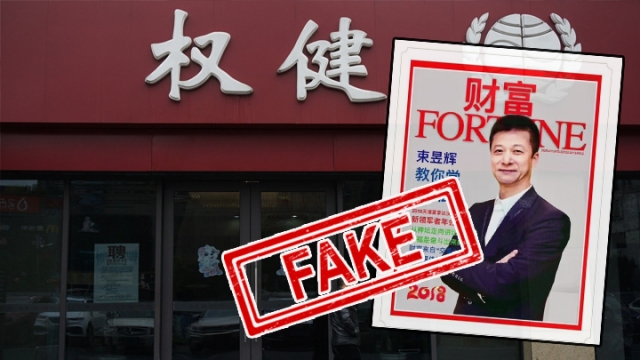Tianjin has been known since imperial days for health-care research and manufacturing. Tong Ren Tang, a 350-year-old herbal-medicine business, is based in the nearby capital. It is the best-known maker of traditional Chinese medicine, a system of often unproven remedies that goes back 2,500 years. Zhu Yonghong, co-founder of Tasly, a big traditional-medicine firm in Tianjin, says Quanjian and firms like it set up in Tianjin to profit from Tong Ren Tang’s aura. According to Mr Zhu, they “blurred the line” between regulated traditional medicine and outright quackery.
天津自封建王朝以來就以醫療研究和生產而聞名。擁有350年歷史的中藥企業同仁堂就坐落在附近。同仁堂是中國最著名的中藥生產商,中藥是一種已有2500年歷史的治療方法,但通常未經證實。天津大型傳統醫藥公司塔斯利的聯合創始人朱永紅說,權健以及類似這樣的公司在天津設立是為了從同仁堂的光環中獲利。朱表示,他們“模糊了”受監管的傳統醫藥與徹頭徹尾的江湖醫術之間的界限。

Quanjian’s founder, Mr Shu, first came to the port to work for Tianshi (known abroad as Tiens), a large seller of health products. The company’s name means “heavenly lion”. Two such beasts with gigantic wings flank the entrance to Tianshi’s headquarters. The firm says it has more than 10,000 staff in 110 countries. It also owns hotels, a college and a hot-spring resort. Its chairman, Li Jinyuan, a former oilfield worker, is Tianjin’s richest man. In 2015 he took 6,000 staff to France on a splashy holiday. Sustaining this are Tianshi’s machines offering diagnoses based on palm-readings. They claim to detect ailments ranging from HIV to hepatitis, for which the firm offers pricey treatments.
權健創始人舒玉輝剛到天津港時在大型保健品銷售商天獅(國外稱為天獅)工作。公司的名字用英文解釋為“heavenly lion(天上的獅子)”。在天師大本營的入口兩側,就有兩只長著巨大翅膀的巨獸。該公司表示,在110個國家設有分部,員工大達1萬多名。還擁有酒店、一所大學和一個溫泉度假村。該公司董事長、前油田工人李金元是天津首富。2015年,他帶著6000名員工去法國度假。維持這種營收靠天獅的機器,通過掌紋等信息就可以提供診斷。并聲稱能檢測出從HIV到肝炎等各種疾病,該公司為這些疾病提供昂貴的治療。
According to his biography, Mr Shu later set up Quanjian with 600 secret traditional recipes (he is said to come from a family of herbal doctors). A board in the entrance to his shuttered hospital reads: “To say something is real that isn’t, is deception; to make something real that isn’t, is skill.” A user on Weibo, a Twitter-like site, sums up the appeal: “Quanjian tells patients they will live when hospitals tell them they will die.”
據其傳記記載,舒玉輝后來用600道傳統秘方創立了權健(據說他來自一個中藥世家)。在其關閉的醫院門口的牌子上寫著:“把本來不真實的東西說成真實,是欺騙;讓本來不真實的東西變成真實,是技巧。”一位微博(類似推特的軟件)用戶總結了這一吸引力:“在醫院告知病人痊愈幾率為零時,權健卻告訴他們可以痊愈。”
To boost demand for its products, Quanjian devised an alluring scheme. Buying seven pairs of the magic insoles would earn a member the right to become a distributor. To innocent consumers, that seemed above-board: Quanjian has all the trappings of a legal direct-sales firm, including licences from the Ministry of Commerce (in February the ministry said it had suspended the issuing of permits for direct selling). But Quanjian’s pyramid-type recruitment method is banned. Companies that use it are commonly described in China as “business cults”. That is because gangs often ensnare jobseekers into joining. Ecstatic rallies keep alive participants’ illusory dreams of enrichment.
為了刺激對其產品的需求,權健設計了一個誘人的方案。購買七雙魔術鞋墊就可以從會員成為經銷。對無辜的消費者來說,這似乎是光明正大的:權健擁有合法直銷公司的所有標志,包括商務部頒發的許可證(商務部今年2月表示,已暫停發放直銷許可證)。但權健的金字塔式招聘方法是被禁止的。在中國,使用這種方式的公司通常被稱為“商業邪教”。這是因為犯罪團伙經常誘騙求職者加入。瘋狂的集會讓參與者一直懷揣致富夢想。
譯文由可可原創,僅供學習交流使用,未經許可請勿轉載。












